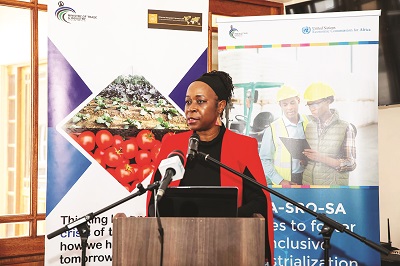By T’soloane Mohlomi
MASERU – The Government of the Kingdom of Lesotho recently hosted an expert engagement with stakeholders to better address and improve the conditions which Micro Small and Medium Enterprises (MSMSE) thrive under, through proposed policy amendments and frameworks.
Hosted through the Ministry of Trade, Industry, Business Development, and Tourism in collaboration with the United Nations Economic Commission for Africa (UNECA), Sub Regional Office for Southern Africa (SRO-SA), and the United Nations System in Lesotho, the two-day Regional Policy Dialogue (RPD) aimed to explore the sustainability of MSME’s in Southern Africa, this through the leveraging of local content policies (LCP’s) and frameworks.
The rationale and main aim of this meeting for regional member states and other stakeholders was to share experiences on utilizing LCPs and frameworks in supporting development. Additionally, the dialogue assessed the alignment and harmonization of regional and national content policies and frameworks in Southern Africa.
Speaking at the meeting, the Principal Secretary of, the Ministry of Trade and Industry, Business Development and Tourism, Mr. Pokello Mahlomola highlighted that the strategic approach to Micro, Small, and Medium Enterprises (MSME) development must focus on enhancing their survival rates through tailored training programs, facilitating access to information, improving financial accessibility, creating favourable fiscal policy environments, and assisting in the adoption of modern technology.
“Ladies and gentlemen this symposium is taking place at a crucial time; the region is facing challenges in the integration processes and in the achievement of aims and objectives highlighted in strategies like the Sustainable Development Goals (SDG 8 and 9) respectively as to promote inclusive and sustainable economic growth and decent work for all, and to build resilient infrastructure, promote inclusive and sustainable industrialization and to foster innovation.
“We recognize with regret, the slow pace of global economic recovery and the need to address the vulnerable informal job sector which lacks social protection. In this regard, our mission is clear to achieve inclusive and sustainable economic growth, foster resilient value chains, and promote technology transfer and innovation.
“Coming to MSMEs, our strategic approach to MSME’s development must focus on enhancing their survival rates through tailored training programs, facilitating access to information, improving financial accessibility, creating a favorable fiscal policy environment, and assisting in the adoption of modern technology”, he said.
The Principal Secretary further lauded the UNECA for its continuous support to the government of the Kingdom of Lesotho in various recent interventions including; the National Industry Policy Review, the drafting of the National Minerals and Mining Policy, the response to COVID-19, the ratification of the Agreement establishing the African Continental Free Trade Area (AfCFTA), Development of the National Spatial Framework on Gender Issues, and on the Measurement of GDP of the City of Maseru.
Also speaking, Chief of Inclusive Industrialisation UNECA Ms. Olayinka Bandele, on behalf of UNECA SRO-SA Director Ms. Eunice Kwamendo, reiterated that LCPs and frameworks offer opportunities in support of the development of domestic MSMEs, noted that globally an increasing number of countries have introduced or reinforced LCP’s to stimulate the use of local factors of production, such as labor, capital, supplies of goods and services, to create value in the domestic economy and expand the industrial sector and linkages.
“When delivered at scale; LCP creates an enabling environment for private sector development, value chain development and mapping into GVC’s; gender economic empowerment; improved productive capacity; and improved export readiness of participating MSME”, she said.
In hindsight, a study by The World Bank in 2023 found that LCPs had the potential to increase access to finance for MSMEs by up to 20% and that earlier in 2021 the International Labour Organization (ILO) reported that local content policies could improve the skills of MSME’s by 15%.
In another study, the African Development Bank observed that local content policies can increase access to markets for MSMEs by up to 10% while the United Nations Industrial Development Organization in 2019 found that local content policies can promote the development of local industries and supply chains by up to 5%.
Additionally, Ms. Bandele said that while LCP is not a panacea for all ills of an economy, however, it is a proven robust strategy when deployed effectively.
“We at UNECA SRO SA, are keen to support countries in Southern Africa to transform their economies through the benefits that accrue from utilization of LCPs and frameworks.”


